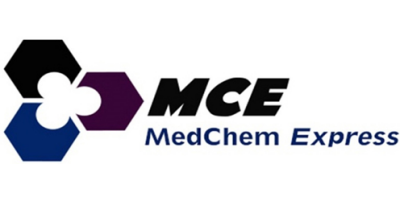

- Home
- Companies
- MedChemExpress LLC (MCE)
- Products
- MedChemExpress - Model Berbamine ...
MedChemExpress - Model Berbamine dihydrochloride - 6078-17-7
Berbamine dihydrochloride is an inhibitor of NF-κB activity with remarkable anti-myeloma efficacy.MCE products for research use only. We do not sell to patients.
Berbamine dihydrochloride
MCE China:Berbamine dihydrochloride
Brand:MedChemExpress (MCE)
Cat. No.HY-N0714A
CAS:6078-17-7
Purity:96.49%
Storage:4°C, sealed storage, away from moisture *In solvent : -80°C, 6 months; -20°C, 1 month (sealed storage, away from moisture)
Shipping:Room temperature in continental US; may vary elsewhere.
Description:Berbamine dihydrochloride is an inhibitor of NF-κB activity with remarkable anti-myeloma efficacy.
In Vitro:Berbamine, a novel NF-κB inhibitor, inhibits growth and induces apoptosis in human myeloma cells. Berbamine treatment leads to increased expression of A20, down-regulation of IKKα, p-IκBα, and follows by inhibition of p65 nuclear localization. As a result, NF-κB downstream targets such as cyclin D1, Bcl-xL, Bid and survivin are down-regulated. To determine whether Berbamine has growth inhibitory effect on myeloma cells, KM3 cells are treated with Berbamine at various concentrations for 24, 48, and 72 h, respectively, and then cell viability is assessed by MTT assays. Berbamine inhibits the growth of KM3 cells in a dose- and time-dependent manner, and the IC50 values are 8.17 μg/mL, 5.09 μg/mL, and 3.84 μg/mL for treatment of 24, 48, and 72 h, respectively. In contrast, IC50 value of Berbamine for normal hematopoietic cells is 185.20 μg/mL at 48 h[1].
In Vivo:Berbamine (BBM) is a natural bisbenzylisoquinoline product isolated from traditional Chinese herbal medicine Berberis amurensis and has been used to treat inflammatory and other diseases.The anti-tumor effects of Berbamine are determined on a xenograft animal model. Two liver cancer cell lines, Huh7 (epithelial) and SK-Hep-1 (mesenchymal-like), are inoculated into NOD/SCID mice by subcutaneous injection. The oral Berbamine treatment greatly suppresses the growth of Huh7 xenografted tumors over the time and leads to a tumor reduction by 70% based on the tumor weight. The growth of SK-Hep-1 cells in NOD/SCID mice is less sensitive to Berbamine than that of Huh7. There is a significant suppression of the growth of the SK-Hep-1 xenograft with more than 50% reduction of the tumor weight[2].
Animal Administration:Mice[2] 5×106 Huh7 cells in 50% Matrigel dissolved in PBS are inoculated in a NOD/SCID mice. 5×106 SK-Hep-1 cells are applied for each xenograft without Matrigel. 100 mg/kg of Berbamine is orally treated to mice with a regimen of twice a day for 5 consecutive days after the tumors reach a size of 2 mm in diameter. After 2 days withdraw, the regimen is repeated once[2].
Cell Assay:The inhibitory effect of Berbamine on growth of KM3 cells is measured by MTT assay. Briefly, KM3 cells (8×103 per well) are incubated with increasing concentrations of Berbamine (1-32 μg/mL) for 24, 48, or 72 h and then pulsed with 20 μL of 5 mg/mL MTT for the last 4 h, 200 μL DMSO is then added to dissolve the formazan crystals. Dye absorbance in viable cells is measured at 570 nm, and then the inhibitory concentration of 50% (IC50) is calculated[1].
IC50 & Target:NF-κB Autophagy
Hot selling product:Darapladib | Teclistamab | SHP099 | Methotrexate | TRULI | Pasireotide (acetate) | Nile Red | Pirtobrutinib | α-MSH | PSB-620
Trending products:Recombinant Proteins | Bioactive Screening Libraries | Natural Products | Fluorescent Dye | PROTAC | Isotope-Labeled Compounds | Oligonucleotides
References:
[1]. Liang Y, et al. Berbamine, a novel nuclear factor kappaB inhibitor, inhibits growth and induces apoptosis in human myeloma cells. Acta Pharmacol Sin. 2009 Dec;30(12):1659-65. [Content Brief]
[2]. Meng Z, et al. Berbamine inhibits the growth of liver cancer cells and cancer-initiating cells by targeting Ca2+/calmodulin-dependent protein kinase II. Mol Cancer Ther. 2013 Oct;12(10):2067-77. [Content Brief]
Brand introduction:
• MCE (MedChemExpress) has a global exclusive compound library of more than 200 kinds, and we are committed to providing the most comprehensive range of high-quality small molecule active compounds for scientific research customers around the world;
• More than 50,000 highly selective inhibitors and agonists are involved in various popular signaling pathways and disease areas;
• The products cover a variety of recombinant proteins, peptides, commonly used kits, more PROTAC, ADC and other characteristic products, widely used in new drug research and development, life science and other scientific research projects;
• Provide virtual screening, ion channel screening, metabolomics analysis detection analysis, drug screening and other professional technical services;
• It has a professional experimental center and strict quality control and verification system;
• Provide LC/MS, NMR, HPLC, chiral analysis, elemental analysis and other quality inspection reports to ensure the high purity and high quality of products;
• The biological activity of the products has been verified by the experiments of customers in various countries;
• A variety of top journals such as Nature, Cell, Science and pharmaceutical patents have included the scientific research results of MCE customers;
• Our professional team tracks the latest pharmaceutical and life science research and provides you with the latest active compounds in the world;
• It has established long-term cooperation with the world's major pharmaceutical companies and well-known scientific research institutions。
